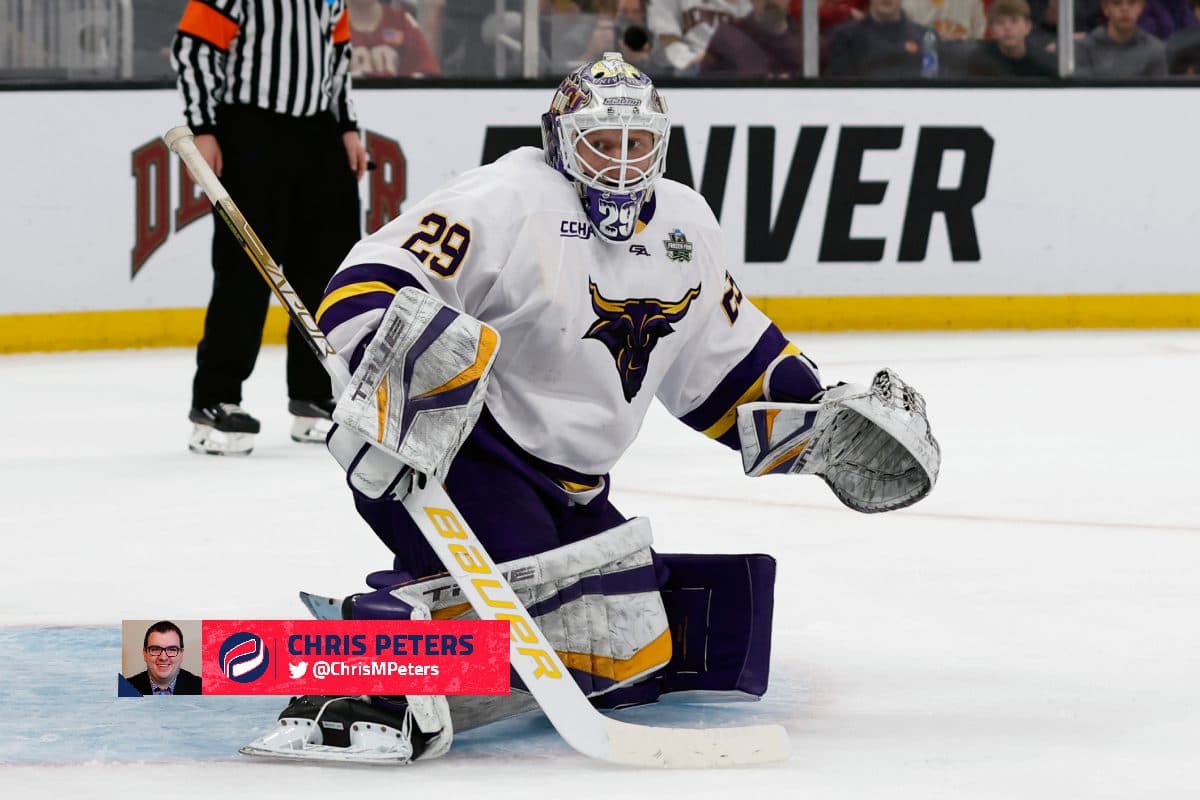
Minnesota State goaltender Dryden McKay, the 2022 Hobey Baker Memorial Award winner as the top player in men’s college hockey, has been sanctioned by the U.S. Anti-Doping Agency after testing positive for a banned substance. According to USADA, McKay has accepted a six-month period of ineligibility for the violation, a ban that could have been much worse if USADA’s investigation did not conclude McKay had inadvertently consumed a contaminated supplement leading to his positive test.
According to USADA’s announcement, McKay tested positive for Ostarine on Jan. 23, which is classified as a “non-specified substance in the class of anabolic agents” and on the World Anti-Doping Agency Prohibited List. It is also a banned substance in NCAA competition.
A normal ban for such a substance is four years from the positive test. However, USADA says that in the course of its investigation, the product McKay had used prior to testing positive did not list ostarine on its Supplement Facts label. USADA determined through its own testing that the supplement was “contaminated at an amount consistent with the circumstances of ingestion and his positive test.” As a result, the World Anti-Doping Code allows for a substantial reduction of the suspension.
The reason McKay was tested at all was because he was included as an alternate goaltender for the U.S. Olympic Men’s Hockey Team and had to undergo all protocols as players on the actual roster, which included a doping test.
“On February 1, much to my surprise, I was notified that my urine sample was contaminated with minute levels (trillionths of a gram) of a substance I had never heard of before called Ostarine,” McKay explained in a written statement released on Twitter. “The source was an ‘all natural’ contaminated non-NSF vitamin D3 immune booster that I consumed for less than two weeks because of the advertised antiviral and immunity boosting benefits.
“I know the source because I had all the supplements I was taking shipped to an independent lab immediately to find the source of contamination. The lab found Ostarine contaminants in my opened bottle of the ‘all-natural’ vitamin D3 immune booster I was taking.”
McKay obtained the services of attorney Paul Greene, who specializes in anti-doping cases. He was able to get the case in front of an independent sports arbitrator in hopes of having McKay’s provisional suspension lifted to allow him to continue competing for Minnesota State.
The independent sports arbitrator considered the small amount in his system and also ruled that McKay had met the burden of proof that the violation had likely resulted from use of a contaminated product, which opened the door for him to compete.
“It’s very hard to get a provisional suspension lifted,” Greene told Sportsnet. “It doesn’t happen very often. If we didn’t get it lifted, he never would have played again. On Feb. 3, that would have been it.”
McKay said in his statement that the NCAA was fully aware of the process and issued a separate decision that allowed him to compete in NCAA games.
His ineligibility to compete began April 14 – five days after he played in the NCAA national championship game with Minnesota State in a 5-1 loss to Denver and six days after he received the Hobey Baker. The 25-year-old Illinois native appeared in 16 games after his testing date. Because the NCAA allowed him to play during the course of the investigation, his results and those of the Minnesota State men’s hockey team are not expected to be wiped. The only date USADA says he would be disqualified from is Jan. 23, a date on which he did not play a game.
McKay says he has agreed to accept the six-month ban offered by USADA to put this episode behind him.
“I am, and have always been a clean athlete who has never taken shortcuts,” he said in a statement. “I don’t take muscle building or performance enhancing supplements or creatine and never will. Now, I and many athletes from all over, have better knowledge, that even a vitamin can cause you to test positive. This experience has been a very unexpected and difficult matter for me and my family. I am so grateful for all the support. I am remaining optimistic and looking forward to beginning my pro career this fall.”
Athletes are responsible for what they put in their bodies, which is why there is still some punishment despite the circumstances of how the investigation concluded McKay tested positive. In the end, he did ingest a non-regulated supplement with good intentions, but was met with a near-disastrous outcome.
McKay will become eligible to compete in games by Oct. 11, and can resume training in August, which clears the way for him to be ready for training camps, should he get a pro deal. Despite winning the Hobey Baker and having a record-setting NCAA career, McKay appears unlikely to get an NHL contract right away. It is more likely, however, that he can sign an AHL contract in an effort to further prove himself to NHL teams.
______


